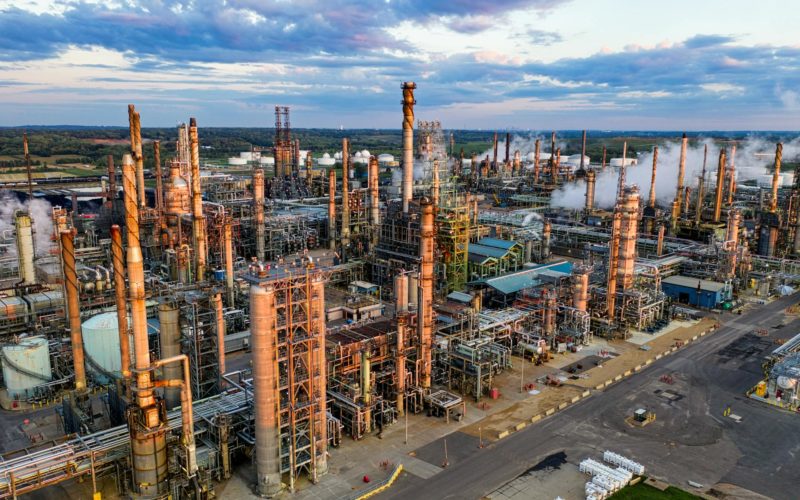Managing oil refineries requires a heavy emphasis on efficiency and safety. Thus, effective workflow management is vital for success in this industry.
According to Statista, in 2023, the global oil refining market reached a valuation of approximately $1.5 trillion. Anticipated growth in crude refining over the next decade is driven by the escalating demand for transportation fuels, lubricants, and various other petroleum products.
Executives overseeing these complex operations at refineries bear the weight of ensuring seamless processes while navigating challenges unique to the industry. From optimizing production to maintaining stringent safety standards, refinery executives require a comprehensive approach to workflow management.
Here are some invaluable tips to help refinery executives streamline operations and enhance productivity.
#1 Embrace Advanced Technology Solutions
Incorporating cutting-edge technology into refinery operations can revolutionize workflow management. According to IBM, implementing monitoring systems and Internet of Things (IoT) devices, allows executives to gather real-time data on various aspects of refinery processes. This data-driven approach enables proactive decision-making, identifies inefficiencies, and mitigates potential risks promptly.
Additionally, predictive analytics and machine learning algorithms can forecast equipment failures and minimize costly downtime. By embracing technological advancements, refinery executives can stay ahead of the curve and drive operational excellence.
Similarly, process analyzer systems play a crucial role in oil refineries by providing real-time monitoring and analysis of various parameters throughout the refining process. According to Modcon Systems Ltd., these systems enable continuous measurement of key variables like temperature, pressure, etc., ensuring optimal performance and product quality.
By delivering instant feedback on process conditions, they facilitate timely adjustments and troubleshooting, enhancing efficiency and safety. Moreover, process analyzers aid in compliance with regulatory standards by monitoring emissions and waste streams. For more information about process analyzer systems, click here.
#2 Foster a Culture of Continuous Improvement
Continuous improvement lies at the heart of successful workflow management in oil refineries. Executives should cultivate a culture where employees at all levels are encouraged to identify areas for enhancement and contribute innovative solutions.
Establishing cross-functional teams dedicated to process optimization and regular performance reviews fosters collaboration and drives efficiency gains. By prioritizing ongoing learning and development initiatives, refinery executives empower their workforce to adapt to evolving industry trends and embrace change proactively.
Embracing a culture of continuous improvement not only enhances workflow efficiency but also strengthens employee engagement and morale.
#3 Prioritize Safety and Compliance
In the highly regulated environment of oil refineries, ensuring safety and compliance is non-negotiable. As reported by OILMAN Magazine, common injuries experienced by oil workers include fractures, burns, paralysis, and head injuries. Therefore, executives must prioritize robust safety protocols and adhere to stringent regulatory standards to protect both employees and the surrounding environment.
Investing in comprehensive safety training programs, conducting regular safety audits, and fostering a zero-tolerance safety culture are essential components of effective workflow management. By proactively identifying and addressing potential hazards, refinery executives can minimize the risk of accidents, safeguarding their operations’ reputation and integrity.
Prioritizing safety and compliance not only enhances workflow efficiency but also reinforces trust with stakeholders and the wider community.
#4 Optimize Supply Chain Integration
Seamless integration of the supply chain is critical for refinery executives to maintain operational agility and maximize efficiency. Collaborating closely with suppliers and distributors streamlines procurement processes, reduces lead times, and ensures a steady supply of raw materials and finished products.
Implementing advanced inventory management systems facilitates real-time tracking of inventory levels, minimizing stockouts and excess inventory holding costs. Moreover, establishing strategic partnerships with logistics providers enables executives to optimize transportation routes and reduce freight costs.
By optimizing supply chain integration, refinery executives can enhance operational flexibility and responsiveness to market dynamics.
#5 Implement Lean Manufacturing Principles
Applying lean manufacturing principles is instrumental in eliminating waste and optimizing resource utilization in oil refineries. Executives should identify and eliminate non-value-added activities across all stages of the production process, such as overproduction, excess inventory, and unnecessary downtime.
Implementing just-in-time (JIT) inventory systems and kanban scheduling techniques optimizes production flow, reduces lead times, and minimizes storage costs. Also, fostering a culture of continuous process improvement empowers employees to suggest and implement lean initiatives, driving efficiency gains and cost savings.
#6 Leverage Data Analytics for Informed Decision-Making
Leveraging analytics is a must for refinery executives to make informed decisions and drive performance improvements. By harnessing the power of data analytics tools and techniques, executives can gain valuable insights into production trends, equipment performance, and market demand dynamics.
Analyzing historical data enables executives to identify patterns, forecast future demand, and optimize production schedules accordingly. Moreover, implementing real-time dashboards and Key Performance Indicators (KPIs) allows executives to monitor operational metrics and performance indicators continuously.
By leveraging data analytics, refinery executives can make data-driven decisions, optimize resource allocation, and drive operational efficiency.
Frequently Asked Questions (FAQs)
How do oil refineries work?
Oil refineries process crude oil into various petroleum products through distillation, cracking, and other refining processes. Crude oil is heated, separated into different components based on boiling points, and further treated to remove impurities. The final products include gasoline, diesel, and various other petrochemicals.
Why is it difficult to manage an oil refinery?
Managing an oil refinery is challenging due to complex operations, stringent safety regulations, and volatile market conditions. Refineries require skilled personnel to oversee intricate processes, ensure equipment reliability, and maintain environmental compliance. Additionally, fluctuations in crude oil prices and demand for refined products add further complexity to refinery management.
What are the main challenges of working as an oil refinery executive?
Oil refinery executives face the challenge of navigating fluctuating oil prices and market demand, impacting profit margins and strategic planning. They must also prioritize safety and environmental concerns amidst complex refining processes and regulatory compliance. Additionally, managing geopolitical risks and maintaining effective stakeholder relationships are critical aspects of their role.
In conclusion, effective workflow management is essential for refinery executives to navigate the complexities of oil refinery operations successfully. By embracing the tips above, oil refinery executives can streamline operations, enhance productivity, and maintain a competitive edge in the industry.
With strategic planning and proactive execution, refinery executives can overcome challenges and achieve sustainable growth in the dynamic landscape of oil refining.












